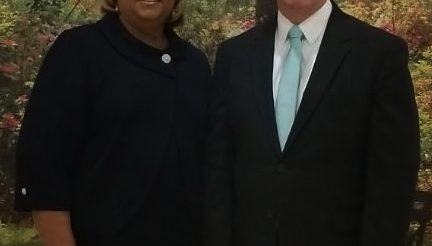Innovation, Expertise and Experience: Mark Condon Candidacy


Tamara C. Curry & Irv Condon
By Barney Blakeney
Last August Charleston County Probate Court Judge Irv Condon and Associate Probate Court Judge Tamara C. Curry celebrated 20 years working together in the probate court. They hope to continue that partnership if Condon is elected to a seventh consecutive term in office.
“We’re running as a team,” Condon take says of the relationship forged between the two attorneys. “Irv asked me to apply for the associate judge’s position in 1998,” Curry explains. As a team they’ve made Charleston County Probate Court a model for national excellence. Condon was familiar with Curry’s work in probate court while she was in private practice, and despite their different political affiliations – Condon is a Republican, Curry is a Democrat – Condon felt the experience Curry would bring to the position could be an asset. His intuition and insight has paid off.
Condon’s unassuming persona masks his intellect and vision. Over the past 20 years the tandem has made Charleston County Probate Court one of the most innovative in the nation. Also a trained Certified Public Accountant Condon said one of the most innovative things he’s accomplished is the system of case management for the probate court.
The court’s four judges, all attorneys, share the daunting task of litigating several thousand active cases between four divisions. But Condon is quick to share accolades with the probate court’s staff. Condon notes the case management system allows each judge to retain oversight in a case from start to finish. Curry added the staff’s experience also provides an element of caring that makes cases, which sometimes is litigated for many years, navigate the legal processes less abrasively.
That’s often difficult with cases ranging from nominal amounts of money to wealthy cases that can tie up legal proceedings for years, Curry said. Technical legal maneuvers require judges to stay focused, Curry said. But at the same time, they must remain sensitive to the needs of others whose interests may be less financial.
In 1999 Condon initiated the Adult Drug Court to give people a second chance. Five years ago the probate court took over the county’s Juvenile Drug Court as well. And realizing that an Adult Mental Health Court was needed, Condon asked Curry to study a similar court in Seattle, Wash., before implementing one here. More recently the court will be instituting a Veterans Treatment Court serving veterans with mental health, drug and/or alcohol issues.
“We started to see so many people with various issues so we created strategies to address their needs,” said Curry. “Charleston County has been ahead of the curve, but we’re starting to see some of our innovations implemented across the nation,” Condon added. To stay ahead of the curve the court began conducting estate planning workshops 10 years ago. Condon smiles saying he he likes going into the community to talk about what the court does and how it can assist people.
“Our job is really about providing comprehensive representation to insure that individuals have a fair trial. It’s about experience, qualifications and expertise.” Condon said, “This job isn’t political or Black or white. It’s about finding ways to help those who can’t afford legal services. And it’s about experience.”
